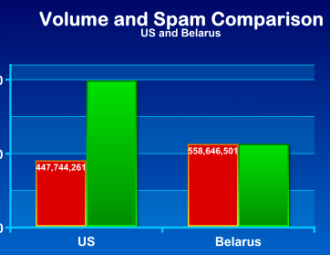Top spam source country: Belarus

Recently, we have seen a large increase in the amount of Spam coming from Belarus. This traffic took a drastic spike back on April 13th this year and has not shown any sign of a decline since then.
Since January 1st, we were seeing an average of 3.1 million spam messages per day from Belarus. After the spike happened on April 13th, we are now seeing an average of 12.3 million spam messages per day and climbing.

Looking at all the messages coming from Belarus, 99.9% of them are being held as spam messages.

The actual message content was very slim and simple. Most of the messages just simply contained a link and a few words. Many of the links did not lead to active webpages, with most giving 500 or 404 server errors. The links that did work lead to pharmacy websites trying to sell drugs to visitors. There was a very small amount of the messages that also lead to websites hosting malware that we were catching.
Overall the United States still comes out number one in total message volume. Since April 13th, there have been close to 1 billion messages sent from the United States to our customers, but only a little over 500 million from Belarus in total. Belarus has just taken over for top country sending in Spam for now.

It’s normal for us to see traffic spikes with various spam and malware campaigns as they come and go; however this one has been significant with the Belarus Spam Volume consistently having a higher Spam Volume than the United States. Our teams are constantly on the lookout for these fluctuations in traffic, so we are able to respond appropriately to any abnormalities in that we see on a day to day basis. In many cases, like this one with Belarus, we are able to respond and take care of the unwanted traffic in a way that our customers will not have their day to day business affected by spam.
-
03.01
-
07.10
-
22.09
-
17.08
-
12.08
-
30.09











































